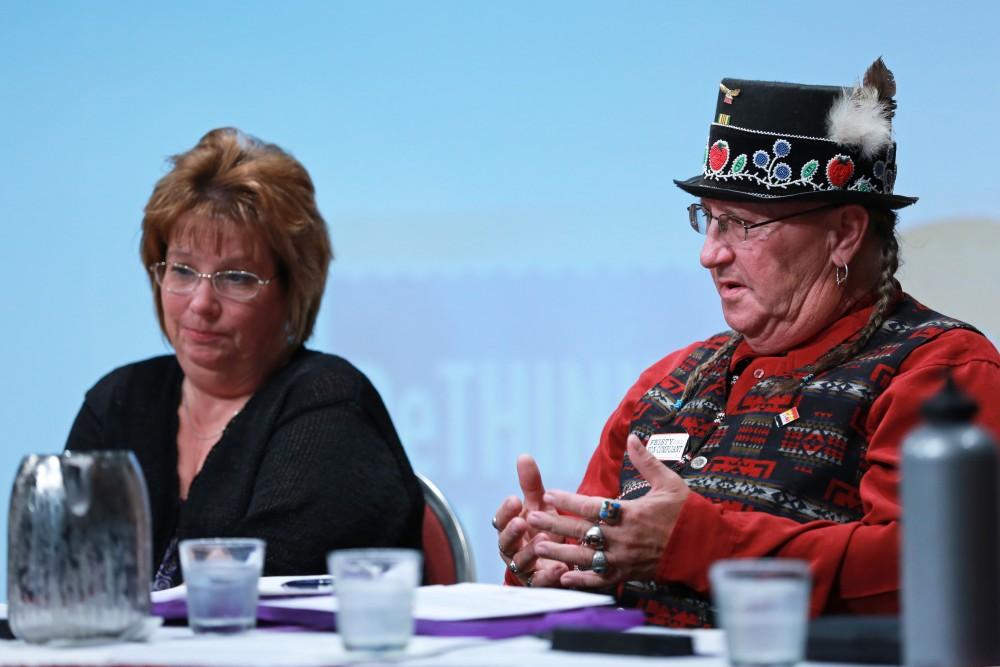Rethinking Columbus Day

GVL / Kevin Sielaff Steve Perry, member of the GVSU Native American advisory board, speaks during the Re-Thinking Columbus event on Oct. 12 in Loosemoore Auditorium.
Oct 15, 2015
“In 1492, Columbus sailed the ocean blue…” Many people know the story, but most don’t realize that that’s all it is – a story.
Recently, there has been a push to end the celebration of Columbus Day as a national holiday. There have been eight cities, including Albuquerque, New Mexico, Portland, Oregon and Oklahoma City that have recently abolished the age-old holiday in favor of a more culturally-sensitive Indigenous Peoples Day celebration.
On Monday night, Grand Valley State University hosted a panel discussion called “Rethinking Columbus: A movement toward Indigenous Peoples Day” in the Loosemore Auditorium on the Pew Campus. The discussion was held because the panel members wanted to start the conversation about breaking down the day when it would be most relevant for students and other attendees.
“What has happened is that (history) becomes romanticized. We all grew up with the three ships that sailed in 1492, that’s a great story, but that’s all that it is, a story,” said Lin Bardwell, project manager of the Gi-gikinomaage-min project at the Kutsche Office of Local History and chair of the Grand Rapids Community Relations Commission. “Creating this event creates the discussion, it challenges the system that has been set up to sell you this patriotic story of discovery.”
Panel members included Bardwell, Patti Caudill, diversity and inclusion manager for the city of Grand Rapids, Steve Perry from the GVSU Native American Advisory Board and Ben Williams, a vocal community member and advocate.
The discussion began by talking about the recent change in legislation across the country and the state and bringing that change into Grand Rapids. Alpena and Traverse City are the first Michigan cities to replace the federal holiday with Indigenous Peoples Day.
“I think we need to continue to… get unanimous support, whether it be this administration or the next,” Bardwell said. “I’d like to see Grand Rapids at the beginning of this movement and not at the end.”
The panel also addressed what Columbus Day is, why we celebrate it, who Christopher Columbus is and how he treated Native people. Perry talked about the “unlearning” process it takes for people to understand that though he is celebrated, Columbus was not the person that people remember him as.
“History books are written by the majority culture, and they try to whitewash a lot of things,” he said. “(Historians) do not want people to know about these tragedies.”
Christopher Columbus is one of two individuals with federal holidays in their honor, the other being Martin Luther King, Jr.
Williams said that while he understands why Columbus Day exists and began in the first place, the stark difference between the two individuals with holidays makes it obvious that people don’t know enough about Columbus’ history.
“When you look at the actual history, you’re putting into question everything that someone’s been taught for their entire lives,” Bardwell said.
Perry was involved with the change in Traverse City, and he said that the same type of ground-up change needs to happen in Grand Rapids.
“(Grassroots) is the best method when you’re trying to have a political voice,” Caudill said. “The best place to have a political voice is at the municipal level, that’s your best opportunity to have someone hear what you’re saying and understand what you’re saying.”
Though it will take months, the panelists are hopeful the initiative will take hold in the city and get passed as soon as it can. Through education and consistent exposure, the panelists said they all aim to take action in the community, and urged others to get involved.

























